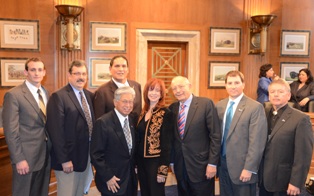Washington D.C. –
U.S. Senator Daniel K. Akaka (D-Hawaii), Chairman of the Senate Committee on Indian Affairs, chaired an oversight hearing today to give tribes and interested stakeholders an opportunity to provide their views on the implications that Internet gaming would have on Indian Country if Congress considers legislation to legalize, regulate, and tax online gaming.
Witnesses expressed concern that Indian Country was not consulted in the past and will not be included as Internet gaming legislation progresses. The witnesses urged the Committee to work to ensure that tribes have equal access to any commercial gaming industry.
 “Indian gaming represents 43 percent of total casino revenue in this country and generates $26.5 billion a year,” said Chairman Akaka, “but tribal leaders have not been offered a seat at the Internet gaming policy table.”
“Indian gaming represents 43 percent of total casino revenue in this country and generates $26.5 billion a year,” said Chairman Akaka, “but tribal leaders have not been offered a seat at the Internet gaming policy table.”
“Every single piece of successful legislation dealing with Indian Country over the past few decades has its roots in consultation with tribes before the initial bills were even drafted or introduced. Federal Internet Gaming legislation should not be an exception to this policy of tribal consultation,” said Bruce Bozsum, the Chairman of the Mohegan Tribe.
“Indian gaming has proven to be the best tool for economic development for a great number of Indian tribes. Because of Indian gaming, tribal governments are stronger, our people are healthier, and an entire generation of Indian youth has hope for a better future,” said Ernest Stevens, Chairman of the National Indian Gaming Association. “As a result of these gains, all tribes are concerned when Congress considers changing the playing field with regard to legalized Internet gambling,” said Stevens.
“The draft bills limit Tribes opportunity to engage immediately in internet gaming while assuring that a few States can do so. This lack of parity assures that many Tribes will completely miss the internet gaming opportunities. By the time regulations are developed and tribal applications processed, potential patrons will already have identified their favorite gaming sites. Within a short time, we can expect that there will be a handful of gaming sites that will bring in the largest number of gamers and all the rest will be an afterthought,” said Penny Coleman, the Principal at Coleman Indian Law and former Chief Counsel at the National Indian Gaming Commission.
“Tribes, like States, should be able to opt in or out of internet gaming and not be limited by the decisions of the State that surrounds them. To compete, Tribes need to be able to offer internet gaming wherever it is legally operated in the United States. This also allows all Tribal Nations to compete in the same manner as the States as well as other Tribes,” said Coleman.
“Any federal legislation authorizing Internet Gaming must ensure that Indian Country can protect and preserve the gains tribal nations have made under IGRA, while at the same time allowing us the opportunity to compete on a fair and level playing field with other gaming interests in any legalized Internet Gaming market,” said Bozsum.
“If Internet gaming is legalized, tribal operations are going to need an opportunity to capitalize on this market to protect self-sufficiency,” said Grant W. Eve, a tribal financial consultant.
“Tribes have to be given a seat at the same time as everyone else…they should not surrender their sovereign rights or re-negotiate their compacts,” said Alfonse D’Amato, former US Senator and Chairman of the Poker Players Alliance. “Indian Country should be substantial players in a regulated U.S. market. We would like to see Tribal governments as federally-recognized licensing bodies. We would like to see Tribal gaming enterprises as licensed operators, as well as affiliates and network partners for other licensed operators.”
“The testimony we have heard today makes it clear that this is a very complex issue. I feel that we have just scratched the surface of the issues here today, and I know there are many other tribes and other affected stakeholders that we need to hear from. That is why I intend to convene additional meetings about this issue so my colleagues and I can make sure we are hearing from all interested parties and representing tribal issues in this important matter,” said Senator Akaka.
-END-
Contact: Emily Deimel
Contact Phone: (202) 224-2251
Contact E-mail: emily_deimel@indian.senate.gov
